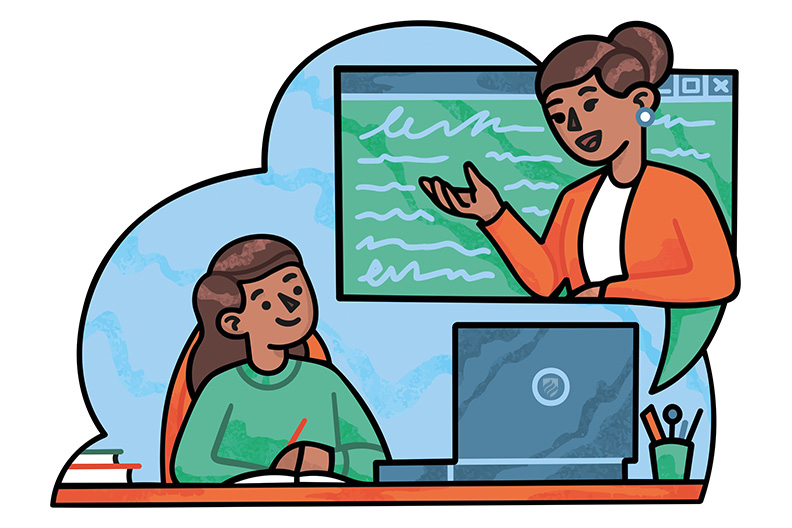I’ve learned that people will forget what you said, people will forget what you did, but people will never forget how you made them feel.”
Maya Angelou Poet and Memoirist
3 Actions Great Teacher Mentors Take
While mentors have many ways to support protégés, great mentors always seem to act in three critical ways.
1. Great Mentors Listen
Being a good listener is the foundation of mentoring. Mentors cannot provide support if they don’t know what is needed. To listen well requires building a foundation of trust so the protégé feels safe in their vulnerability and empathetic responsiveness.
Active listening is an essential skill for all educators, and it is especially important in mentor-mentee communication. Mentorloop’s 10 Key Qualities and Habits of a Highly Effective Mentor defined active listing as having six characteristics. Active listening helps us learn, and good mentors are listening to learn. They want to help mentees consider their options and reflect.
They also pay attention to the non-verbal and emotional messages they are receiving, and they check their understanding as well as provide positive feedback.
2. Great Mentors Intervene
You won’t find many professions where a first-year professional is expected to have the same responsibilities as a 20-year veteran. But new teachers typically have to hit the same high targets for student learning outcomes and professional responsibilities—with the same class sizes and schedules.
Great mentors intervene to ensure their protégés’ responsibilities are equitable and aligned with their experience. This might mean that the mentor runs interference when the mentee is overloaded, requests additional resources, or provides help that takes items off the mentee’s “to do” list. Many well-developed models for supporting new teachers exist, such as the “Shelter-and-Develop” model.
3. Great Mentors Connect
Mentors bring protégés into their “community of practice,” a group of teachers committed to their students and teaching.
Members interact regularly and share their teaching practices—reflecting and refining, sharing stories, and problem-solving together. They build a collective competence and sustain their passion for teaching through their community of practice.
These are not formal groups attending regularly scheduled meetings (i.e., do not confuse them with professional learning communities or team meetings). Communities of practice reflect age-old ways in which teachers have learned from and supported each other. Great mentors connect new teachers to their communities of practice and encourage them to build their own.
Mentoring vs. Induction: There’s a Difference
Often, mentoring combines two related sets of responsibilities. When thinking of mentoring, many people think of training in the practical aspects of teaching, such as knowing how to work the copy machine or basic policies and procedures (e.g., using gradebook software or understanding the school’s mission).
Such information is important and should be part of an induction program for everyone who is new to the workplace. But these responsibilities amount to “induction,” not “mentoring.” A lot of co-workers can successfully support induction. A good mentor will naturally support these low-level needs.
In contrast, mentor responsibilities are grounded in the professional and relational. Great mentors act as teaching partners and provide individualized professional development. They also celebrate the new teacher’s successes, encourage their passions and interests, and address their frustrations and exhaustion.
In mentoring, there is an inherent obligation to support a new teacher in an individualized way over time, ensuring the mentee’s well-being, professional development, and instructional growth, as well as their students’ success.
Great teacher mentors are essential in developing great teachers. Mentoring requires effort and planning, but when it is successful, new teachers thrive and stay in the profession. Meanwhile, P-12 students benefit from having teachers who are the recipients of sustained, high-quality mentoring. And through truly great mentoring, new mentors are developed—because you never forget how wonderful a great mentor made you feel.
Recommended Resources on Teacher Mentoring
Elevate Your Teaching Game at Elmhurst
Keep up to date with the latest teaching practices while earning a master’s degree at Elmhurst University. Our M.Ed. in Teacher Leadership program is designed to make you a more effective teacher—the kind others turn to for solutions.
Learn more today. Just fill in the form below!
About the Author
 Deb Meyer is a professor of education at Elmhurst University and a former classroom teacher in Mesa, Arizona. She teaches undergraduate courses to prospective teachers in educational psychology and upper elementary/middle school literacy methods and graduate courses in teacher leadership.
Deb Meyer is a professor of education at Elmhurst University and a former classroom teacher in Mesa, Arizona. She teaches undergraduate courses to prospective teachers in educational psychology and upper elementary/middle school literacy methods and graduate courses in teacher leadership.
Illustration by Lucie Rice
Posted Nov. 2, 2021







